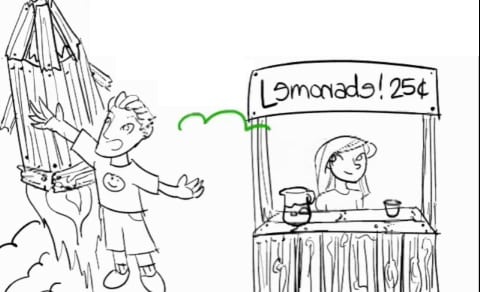Of the four dichotomies, the largest discrepancy lies in the difference between Sensors and Intuitives. Whereas there is an approximate 50/50 split in the population between the other preferences, a full 70% of the population prefers Sensing versus only 30% favoring Intuition.
When you distill it down, the difference between Sensors and Intuitives is this: Sensors prefer reliability of information, and Intuitives prefer speed and depth of insight. This ends up manifesting itself a couple of unique ways. First, Intuitives learn to trust pattern recognition to help them understand information quickly and see things that aren’t ‘there’. Basically, they extrapolate large amounts of information from only a few data points.
Sensors, of course, have this same ability. But they don’t trust it, and so they don’t hone it. Instead, they trust reliable information – things that can be verified in the Real World. Therefore, they become masters of historical information – their own history as well as other people’s. They also become fantastic at manipulating objects in real time. There is no need to question reality when it’s right there in front of you. Reality is reliable. Speculation isn’t.
Second, how they see information informs how both these preferences see time. If real, reliable, solid information is what you choose to focus upon, then the here-and-now context becomes far more important, as well as past information (which used to be the here-and-now context). Sensors can’t rely on what hasn’t happened yet, so the future becomes far less interesting. On the other hand, Intuitives are already comfortable seeing what ‘isn’t there’ – as in, they’re comfortable theorizing and speculating on what could be in both the here-and-now as well as into the future. The past doesn’t really hold their interest any more than a reference point for future predictions.
Third, these differences alter both values and basic interests. For Sensors, values surround things like family, tradition, getting into action, old friends, etc… these are all rooted in the known and knowable, and therefore can be trusted. For Intuitives, values focus more on the cerebral – possibilities, memes, paradigms, perspectives and concepts. Conversation will generally revolve around these things, with little interest in small talk.
Both Sensors and Intuitives have an important role. Sensors often “hold down the fort” – uphold infrastructures that keep us going as a society. Intuitives are generally the “trailblazers” – coming up with new ways of looking at and doing things which fashion new technologies and paradigms. It makes sense that fewer Intuitives would be needed – too much innovation and everything collapses. But without innovation, the world stagnates.
Understanding and appreciating these differences is how we cooperate to create both a stable system as well as pathways to whole new worlds.
When you’re ready, here are five ways we can help you grow…
1. Reclaim Authorship of Your Life (Free Audio): Become the Main Character Your Own Life
2. Regulate your Body, Emotions, Thoughts, & Intuition with Self-Regulation Mastery
3. Understand yourself at a deeper level with a Personality Owners Manual
4. Master the Art of “Deep Reading” people in Profiler Training
5. Rewire your Brain & Build a Life that Fits You in the Personality Life Path


Share:
What's the REAL difference between "Introverts" and "Extraverts?"
Are "Thinkers" Rational, and "Feelers" Irrational?
90 comments
omg i feel the same way
Thought it was just me!! I have taken several tests…On one it even showed the percentages and I was 100 % for INFJ/INFP…took an anneagram test and I was a 9w1..but so close I could be a 9w5..so confusing! Am I literally 2 people????I know I’m different, I know my ways are in a realm all their own…I know I may be needed everywhere by everyone yet known by very very few and never feel I fit in or belong…I just help then move along to help somewhere else..I am too confused from tests to take anymore so I better figure out who I am another way?
You are not alone. I have taken multiple tests by multiple sources. Sometimes they say INFJ sometimes INTJ Sometimes INFP Sometimes INTP So I,m either a complete alien or type xxxx or depends on my mood or I broke the system
Try this site: https://www.michaelcaloz.com/personality/
It tests your cognitive ability. Every other site I’ve tested on inaccurately said I was an INFP. I used this test and got ISFP which is definitely the closest to my cognitive abilities! I had other friends take this test too and they all got more accurate answers that they did for other tests. If not, then just look at the cognitive functions and decide which you most relate to!
The smartest person I know is a sensor and super genius (ESTJ). He is anything but dull.
-ISTP